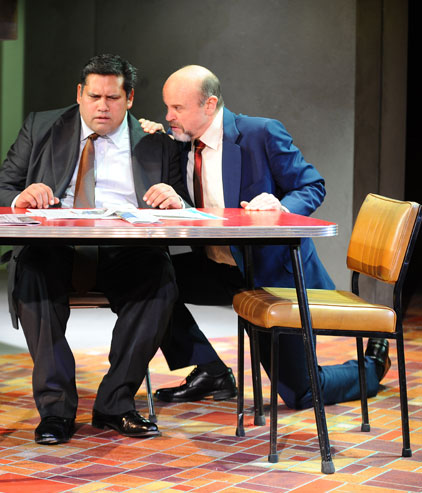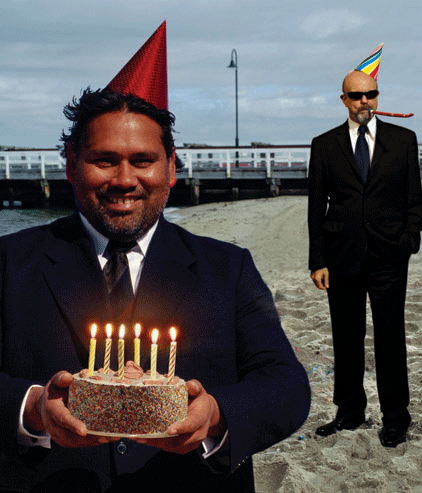
First there was the History Wars. Now we have the Theatre Wars.
The battle lines are drawn, the forces marshaled, the trenches dug, the artillery called in. And it’s about time, if you ask me. We need to confront these issues head on. We need to breach once and for all our great Australian silence.
I know, I know, all of this must sound incredibly hyperbolic for a discussion about theatre. After all, it’s not sheep-stations, right? Or is it?
If our stages are, as Shakespeare tells us, all the world, then surely whatever happens onstage must be a reflection of what happens offstage. And so, because I know there’s a hidden sting in all this, I’m being quite deliberate in choosing military metaphors. It’s important, I think; important to emphasise the fact that there is a war of a kind being fought in this country.
And in fighting this war, history and theatre are not as far from each other as we often presume. If history is what hurts, then perhaps theatre is a looking-glass through which we magnify history: a specific sort of history, however, not history as fact but as representation. In other words, perhaps theatre is a way of finding out what hurts?
The catalyst for all this was of course Julian Meyrick’s production of The Birthday Party.
The debate around this production has been simmering for some time (as can be seen from the deluge of commentary online) but now it has flared right up. In fact, it’s become a bonfire. The difficult thing is trying to work out who’s tied to the stake: Meryrick, the critics, or the whole darned lot of them?
Who wins and who loses out of this? What is at stake? And why are so many normally quiet and thoughtful people behaving so viciously towards one another? Clearly something has happened, some raw nerve has been exposed, and that alone bears close examination.
Before I go any further with this, I think it’s worth saying that any production that causes this much of a stir has to have done something right. Not that the ultimate goal of theatre must be to cause disagreement. But there’s a good argument to be made that art, by definition, should get people talking, arguing and fighting for something.
Let me try and briefly summarise the shots fired thus far.
It all started with Cameron Woodhead’s review for The Age (not online) in which he singled out Isaac Drandic and gave him a particularly vicious drubbing (leaden and inert…an actor reciting lines in the earliest phases of rehearsal). This was followed by Alison Croggon’s review for The Australian and a series of longer reflections on Theatre Notes.
In her review Alison argued, among other things, that:
What is missing…is the uneasy sense of impending terror that underlies the laughter. The human ugliness and savagely bent eroticism that make the play so disturbing are rendered in soft focus; comic, rather than frightening.
On Theatre Notes she expanded on her comments, discussing more fully the significance Stanley’s character and Drandic’s performance:
On the night I saw it, Drandic was a blank: he responded catatonically, with none of the repressed violence so characteristic of Shaw’s performance in the film. This gives the performance nowhere to go, since in the final scene he really is catatonic; because he has been emotionally blank from the beginning, his inability to speak is much less devastating. And it neutralises many of the exchanges in the play, as Stanley is always a passive victim.
Then came the flare from the other side of no-man’s-land. The director, supposed to sit quietly in the trenches while the critics’ mortar flies overhead, suddenly fired back. Julian Meyrick”s response was posted on the official MTC website:
I’m sure both critics said what they felt…but in shaping their responses, everything about The Birthday Party that is different, new, challenging and important has been swept aside.
You might get the impression from the reviews that cross-racial casting…went on all the time, instead of the reality, that it almost never happens. An indigenous cast nailing The Birthday Party is an indication that a new era in casting has arrived. It’s a shift from why (why cast Aboriginal actors) to why not (why not cast Aboriginal actors).
And the point is a good one. The Birthday Party, with less pomp and ceremony than one might expect, has ushered in a new era of casting practices (at least, we hope so).
In this day and age, every director worth their salt should be asking themselves, as Lee Lewis says, what the political significance is of having an all white cast, and what that says about our national identity and how it is projected onstage. This applies not just to Aboriginal actors, but actors of all different racial backgrounds.
But this is simply not the sort of thing that critics think about when they review a show. And fair enough, that would be to review a show by what it achieves offstage and not what it achieves (taking casting as a given) onstage.
A critic cannot help but compare what they see on the night with what they envisage in their mind’s eye, in a Platonic sense. They make an aesthetic judgment and inform us whether desire eclipsed reality or vice-versa. And this is perfectly reasonable; after all, it’s what critics do.

So how do we steer a course between these two perspectives, both of which are valid and deserve our sympathy?
Julian’s rejoinder may be at times plaintive and overwrought, but it’s sincere, and comes from what I believe is the right place. Similarly, Alison’s response on Theatre Notes, makes an irrefutable argument for the necessity of clear headed criticism.
Since the furore broke there has been such an outpouring of words (mainly on Theatre Notes) that I think it’s fair to say that this is no longer an isolated spat but a much larger and more symbolic tussle for supremacy between cultural creators and cultural interpreters.
Unfortunately, a great many of the hand grenades lobbed have been from behind the facade of anonymity, which I find quite difficult to swallow.
There has also been a flurry of commentary in the mainstream press. Critics Raymond Gill and Peter Craven have both waded into the debate. Raymond Gill’s article in The Age professed to take no sides but then politely pointed out that:
The unwritten law is that artists should never respond to negative criticism because it only bolsters the critic’s power and ego.
Peter Craven’s longer response, also published in The Age, was more unambiguous about things:
Julian Meyrick should be grateful to critics…who pay him the courtesy of telling him the ways in which a production of his may fail.
Now, I don’t mean to point out the obvious, but critics don’t visit the theatre out of courtesy. They do it because they get paid to do so. Whereas a director, like Meyrick, is paid to create the theatre they see. So, as a simple logic would have it, it is they who should be grateful, for it is his job that prima facie provides them with theirs.
The other lesson we learn from Craven is that, in this debate, we are dealing with a theatre production for heaven’s sake and not with interventions and land rights.
Which takes me back to the start of this mini-essay and my basic premise that history and theatre (or politics & theatre) are not so far apart as we think. And, if we are willing to concede that, then we must be willing to concede that perhaps critics should be applauding diverse ethnic casting (given that casting is the main vehicle through which we can change conservative theatre pratices).
Perhaps, if I can add my two cents, at the heart of this dispute is not so much a disagreement over whether a particular production (acting, directing, casting etc) is any good, but rather a confusion as to where we think Australian theatre should be headed.
Julian Meyrick thinks one thing, and acts on it, putting his casting where his mouth is. Alison Croggon and Cameron Woodhead think another, and tell us whenever a production doesn’t match up with what that.
All three are trying to have an impact on the unfolding of our cultural history. And all three, no doubt, are sadenned by the fact that blood has been spilt over the performance of a wonderful play by Harold Pinter. Personally, it does saddens me to hear a devoted and talented director at the top of his game publicly ponder whether it’s even worth continuing.
But maybe this is exactly what we need? A little blood spilt. And maybe, just maybe, it’s exactly what surly old Harold would have wanted?
This has turned into a huge rant, and if you’ve made it this far, thanks for sticking with me.
There can be no doubt that there have been too few non-white faces on our mainstream stages. No director in Australia would disagree with that. And in this, as always, the argument has not been so much about what we want to see, but how to make it happen.
Unfortunately, we haven’t proven up to the task, and have fallen far behind other parts of the world. And so, we can no longer nod our heads with Shakespeare and say that all the worlds a stage. Because, the truth is, our stages reflect only a small part of it.
Whatever we think The Birthday Party good, bad or otherwise, we cannot deny that it is an important production. I myself argued that it was well worth seeing. And I know plenty of people who saw it and loved it. And plenty more who blatantly disliked it. I don’t have a problem with any of that; as I said, I think it’s a mark of artistic integrity if a production is divisive.
I guess where I find this whole debate a little confused is that, what is worthy about the production (in terms of process) has not been the major focus, whereas its critical reception and flaws have been. And this has pulled focus from what could have been more of a celebration.
I only hope that this debate helps us to better understand each other and that, when the last shot is fired, we can reach a truce that involves a true reassessment of what, why, and how we do what we do in Australian theatre.
Let’s not make the Theatre Wars a lasting part of our culture like the History Wars. Let’s make them a step in the right direction.




